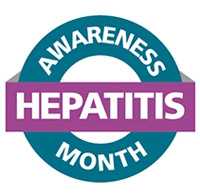Hepatitis Awareness
 Take CDC’s new online Hepatitis Risk Assessment. Answer a few questions and then you will receive personalized viral hepatitis testing and vaccination recommendations.
Take CDC’s new online Hepatitis Risk Assessment. Answer a few questions and then you will receive personalized viral hepatitis testing and vaccination recommendations.
CDC is leading a national education campaign initiative called Know More Hepatitis. The campaign aims to decrease the burden of chronic viral hepatitis by increasing awareness about this hidden epidemic and encouraging people who may be chronically infected to get tested.
Online Hepatitis Risk Assessment
Know More Hepatitis is being featured in May as part of Hepatitis Awareness Month. This year, May 19th will serve as the first ever Hepatitis Testing Day in the United States. Since chronic hepatitis often does not cause any symptoms until serious liver damage has been done, testing for hepatitis is crucial. Find out if you should be tested by taking a 5 minute online Hepatitis Risk Assessment.
This online assessment is designed to determine an individual’s risk for viral hepatitis by asking questions based on CDC’s guidelines for testing and vaccination. The Assessment allows individuals to answer questions privately and print their recommendations to discuss with their doctor.
Hepatitis Overview
 The word “hepatitis” means inflammation of the liver. Hepatitis is most often caused by one of several viruses, which is why it is often called viral hepatitis. In the United States, the most common types of viral hepatitis are Hepatitis A, Hepatitis B and Hepatitis C.
The word “hepatitis” means inflammation of the liver. Hepatitis is most often caused by one of several viruses, which is why it is often called viral hepatitis. In the United States, the most common types of viral hepatitis are Hepatitis A, Hepatitis B and Hepatitis C.
Chronic Hepatitis can lead to Liver Cancer
Unlike Hepatitis A, which does not cause a long-term infection, Hepatitis B and Hepatitis C can become chronic, life-long infections. Chronic viral hepatitis can lead to serious liver problems including liver cancer. More than 4 million Americans are living with chronic Hepatitis B or chronic Hepatitis C in the United States, but most do not know they are infected.
Both Hepatitis B and Hepatitis C can cause liver cancer and have contributed to the increase in rates of liver cancer in recent decades. At least half of new cases of liver cancer are from chronic Hepatitis C.
Priority Populations and Liver Cancer
Some population groups are disproportionately affected by viral hepatitis-related liver cancer. The number of new cases of liver cancer is highest in Asian and Pacific Islanders and is increasing among African Americans, baby boomers, and men.
With early detection, many people can get lifesaving care and treatment that can limit disease progression, and prevent cancer deaths. To find out if you should be tested take the Hepatitis Risk Assessment.
Vaccine-preventable: Hepatitis A and Hepatitis B
Hepatitis A and Hepatitis B can both be prevented with vaccines. Cases of Hepatitis A have dramatically declined in the United States over the last 20 years largely due to vaccination efforts. The Hepatitis A vaccine is recommended for all children at one year of age and for adults who may be at increased risk.
Unfortunately, many people became infected with Hepatitis B before the Hepatitis B vaccine was widely available. The Hepatitis B vaccine is now recommended for all infants at birth and for adults who may be at increased risk.
Follow CDC’s Division of Viral Hepatitis on Twitter @CDChep.
Join the conversation about Know More Hepatitis, use hashtag #KMH; Hepatitis Awareness Month, use the hashtag #HepAware; Hepatitis Testing Day, use hashtag #HTD; and for the Hepatitis Risk Assessment, use hashtag #HepRisk.
More Information
- CDC Viral Hepatitis Homepage
- Hepatitis Risk Assessment
- Know More Hepatitis
- Hepatitis Testing Day
- Resources for Hepatitis Awareness Month and Testing Day
CDC works 24/7 saving lives and protecting people from health threats to have a more secure nation. A US federal agency, CDC helps make the healthy choice the easy choice by putting science and prevention into action. CDC works to help people live longer, healthier and more productive lives.
- Page last reviewed: May 14, 2012
- Page last updated: May 14, 2012
- Content source:
- National Center for HIV/AIDS, Viral Hepatitis, STD, and TB Prevention
- Page maintained by: Office of the Associate Director for Communication, Digital Media Branch, Division of Public Affairs




 ShareCompartir
ShareCompartir